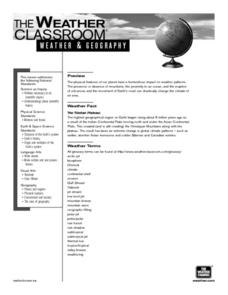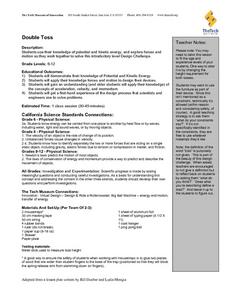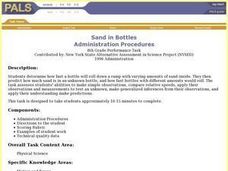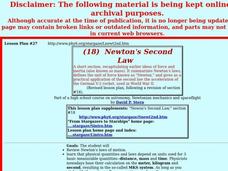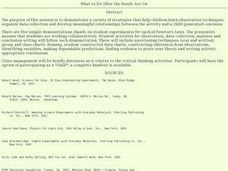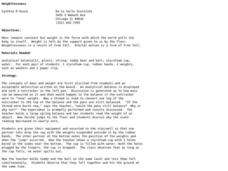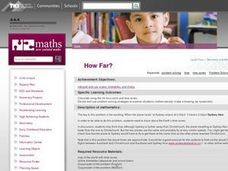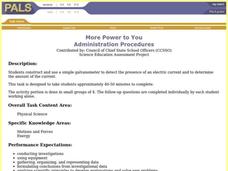Curated OER
Polymers and Products from Petroleum
Over four sessions, learners survey the production and use of polymers and petroleum products. First, they participate in a kinesthetic activity to demonstrate how polymers act, and review a list of common products made from...
NASA
Measuring Dark Energy
You're only 10 minutes late? Do you know how much the universe has expanded in those 10 minutes? Scholars graph supernovae based on their redshift and see if the results verify Hubble's Law. If it does confirm it, the universe is...
University of Colorado
Distance = Rate x Time
Every year, the moon moves 3.8 cm farther from Earth. In the 11th part of 22, classes use the distance formula. They determine the distance to the moon based upon given data and then graph Galileo spacecraft data to determine its movement.
Curated OER
The Tibetan Plateau
Learners discuss the characteristics of the biosphere, with a focus on the Tibetan Plateau. They participate in a question and answer period discussing biomes and climate patterns. They compare and contrast different ecosystems.
Cornell University
Catapult
Studying levers couldn't be more exciting! Learners build their own catapults and test the results as they make adjustments to the fulcrum. They compete against other groups to create the most accurate apparatus.
Curated OER
Water and Ice
Students investigate how water goes from a solid to a liquid then back again. In this experimental lesson students conduct their own experiment and see how water changes form.
Curated OER
Friction: Friend or Foe?
Using a hands-on approach, learners explore the effect of friction on objects. Learners use toy cars, shoes, wood, metal, and more to experiment with the causes and effects of friction. Afterwards, they conduct experiments in which they...
Curated OER
Double Toss
Students experiment with potential and kinetic energy. They design a device that will toss a ball at least 30 centimeters, catch it and to the ball up again.
Curated OER
What is the Rock Cycle and Its Processes?
Geology beginners examine three different rock samples and determine their origin by their characteristics. By making and recording observations, they become familiar with features of igneous, metamorphic, and sedimentary rock types....
Curated OER
Stick-Slip Movement
Ninth graders operate a model to observe the type of motion that occurs at a fault during an earthquake. They explore the effects of several variables. Students measure movement, calculate averages and plot and graph information.
Curated OER
Mass, Volume, and Weight
Students explore mass, volume, and weight. In this science and measurement lesson, students compare volume, mass, and weight after listening to the teacher's description of each. Students explore different scales and balances and...
California Academy of Science
Energy: A Day in My Life
If only we could harness the energy of fifth graders, our energy problems would be over! The class discusses where different forms of energy come from and how we use them. They complete a chart of the activities that they do daily...
Curated OER
Changing Ramp Heights
Students conduct an experiment to determine how the change in ramp height affects the distances a ball is able to move a stationary cup. Data is collected from several trials and recorded and analyzed.
Curated OER
Newton and his Laws
Students explore Newton's laws, including what they state, and what the intuitive meaning is of the first and third laws.
Curated OER
Sand in Bottles
Eighth graders calculate the speed of bottles as they roll down a ramp with varying amounts of sand inside. Using their data, 8th graders estimate speed of three labeled bottles with different amounts of sand and compare those results...
Curated OER
Newton's Second Law
Students examine how physical quantities and laws depend distance, mass and time. They examine the MKS system; meter, kilogram and second, for doing calculations.
Curated OER
Alka-Seltzer Rockets: How to Build Your Own Rocket
Students create a rocket using Alka-seltzer of baking soda and vinegar. In this physics lesson, students identify the factors affecting the length of time the rocket is propelled. They relate this activity to actual rocket launched in...
Curated OER
Exploring Simple Machines
Students investigate simple machines. In this simple machines activity, students study how simple machines work. Students determine the function of various simple machines.
Curated OER
PHYSICS OF FLIGHT
Ninth graders study the basic principles of flight, including the Bernoulli Principle and Newton's Laws. They construct and study model aircraft
Curated OER
Working in Space
Students design and build one of three engineering problems dealing with living and working in space.
Curated OER
What To Do After The Hands-Are-On
Learners perform various demonstrations for each of Newton's Laws, collect data, and write a conclusion for each.
Curated OER
Weightlessness
Students compare and contrast the terms "weight" and "mass". In this physics lesson, students observe an experiment in which objects are placed on a balance scale and weighed under different circumstances. Partners drop items and observe...
Curated OER
How Far?
Students explore how different textures provide varying amounts of friction to objects moving across them. They build a tool to measure the amount of friction between a note card and various surfaces by measuring the distance that a...
Curated OER
More Power to You
Students construct a simple galvanometer in order to detect the presence of an electric current as well as determine the amount of the current. Activity is divided into two parts, first part as group work and second as individual.



